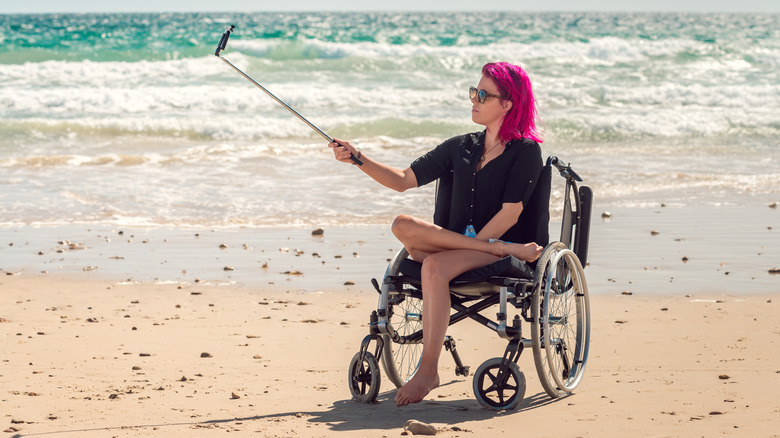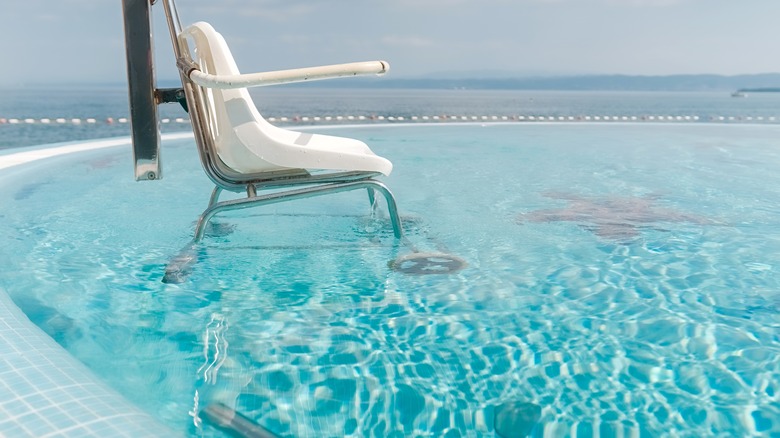How To Unlock Accessible Travel (And Book The Hotel Room You Need)
In 2010, revised regulations to the Americans with Disability Act (ADA) required hotels to maintain a booking system that's accessible to people with disabilities. Whether you're booking over the phone or online, the hotel's booking system (or staff) should be able to describe a room's accessibility features and access to the hotel's amenities adequately enough for you to determine if the hotel meets your specific needs. In addition, the regulations ensure that a guest with a disability receives the accessible room they reserved with the room's specific ADA features.
While these regulations have contributed to more accessible hotels and smoother booking processes, there are still a few tips to consider for guaranteeing your hotel rooms are fully accessible and your stay's fully satisfactory while traveling. In truth, although these revised government regulations have helped individuals with disabilities travel more comfortably, a personal touch between you and the hotel can enhance your overall trip.
Speak and book with the hotel directly
While you'll typically have the option to use a third-party booking site, you can probably save a bit of hassle by communicating with the hotel directly. In some cases, the specifics of ADA amenities may not be fully advertised by a third party. It may also help the reservation process to call the hotel versus booking online.
Speaking with someone directly allows you to clearly specify your needs. In some cases, the front desk may not be familiar with certain terminology. For instance, they may not know what a Hoyer lift is. However, they should know if the accessible room features a bed with enough clearance for a Hoyer lift. Unfortunately, most hotels now feature platform beds with no clearance. By talking with someone directly, you can also ascertain the hotel's ability to make reasonable accommodations.
Using this example, the ADA does not offer any regulations concerning bed height or configuration to accommodate individuals using a wheelchair. If the bed's too high, you can ask if the bedspring can be removed. Or, if the room features a platform bed without any clearance for a lift, you can ask if risers are available. By speaking directly with the hotel, you can better ascertain the specifics of the ADA room and the hotel's ability to make adjustments to meet your needs.
Remember, the room's cost includes amenities
The satisfaction of your stay should consider both the room's comfort and the amenities of the hotel. After all, the cost of your room includes the enjoyment of the hotel's amenities. The minimum requirements under the revised 2010 ADA standards include accessible pools, spas, steam rooms, exercise facilities, and playgrounds for new construction and adjusted facilities.
You can ask the hotel specifically about the accessibility of their amenities, such as access lifts for pools or the accessibility features of onsite restaurants. Depending on the importance of using these amenities, accessibility features (or lack thereof) may inform your decision to stay or not. If the hotel doesn't offer adequate access to amenities, but you're okay with skipping the pool, you may consider asking the front desk to waive their resort fees. A growingly popular fee among hotels, resort fees are typically associated with guest use of amenities. If you're unable to comfortably access the hotel's amenities, the hotel may eliminate its resort fee.
Lastly, it's important to remember that it's illegal for a hotel to upcharge for any reasonable accommodation. Hopefully, by speaking directly with the hotel concerning your needs, they can accommodate you adequately. If not, you can always shop for another hotel. While it may take a few tries to locate the ideal hotel, pleasant stays will surely unlock the potential of your overall travel experience.


